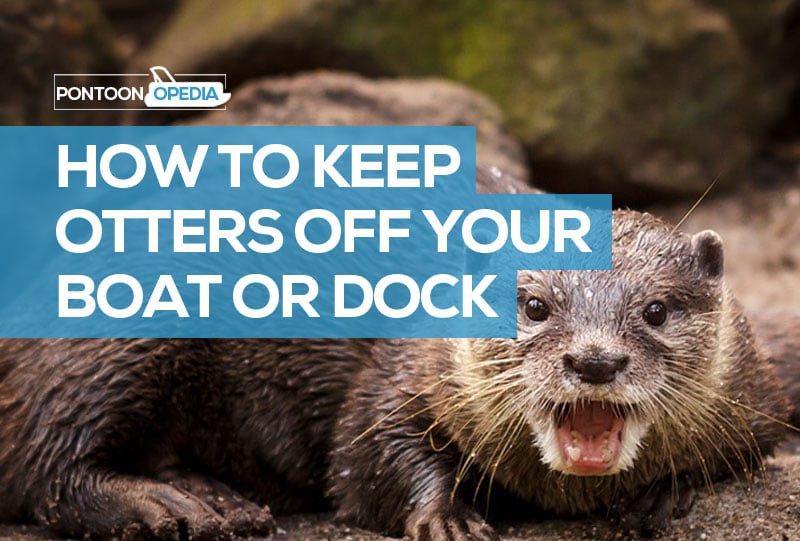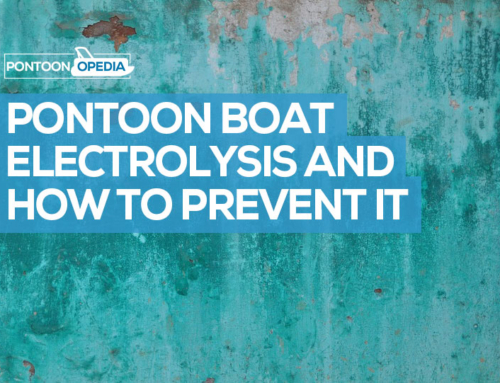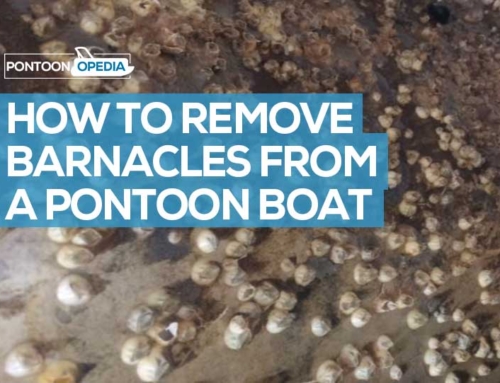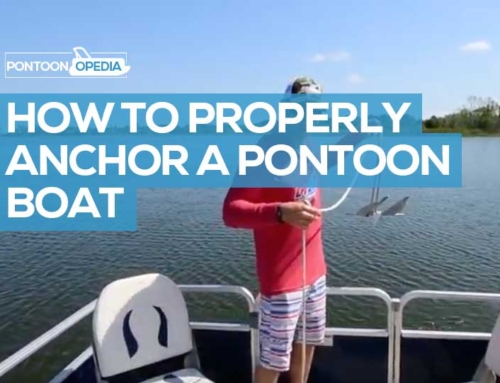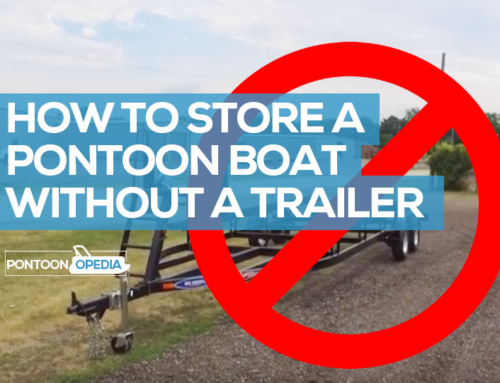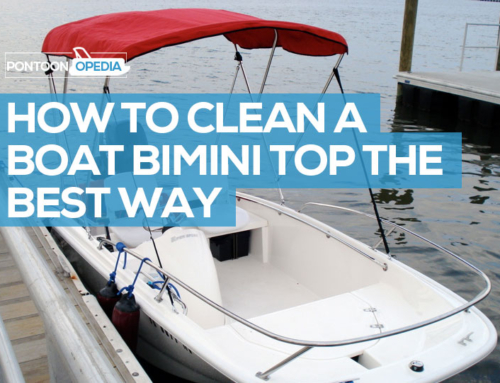I spend a lot of time on boating forums and will often see problems spoken about that I have a little experience of, so can quickly type a response out. But something that caught my eye this week was from a boat owner who was trying to keep otters off his boat and wanted to know what otter repellent would help him get rid of otters.
He posted a load of photos of chewed up seats, poop all over the boat deck, and loads of damage that these critters had caused.
The reason this caught my eye was because in the past I’ve had rats on my boat, and previously published a guide on how to keep rats off – but otters are an entirely different matter altogether.
How Do I Keep Otters Off My Boat?
If that’s your question, then I have some great solutions, not all of which use an otter repellent, which could be harmful to the marine environment.
I spoke with multiple boat owners who have successfully stopped otters getting onto their boat, dock, marina, and boathouse, and have compiled the best otter deterrent methods below.
Before I get into the methods though, please be aware that there are some preventative measures you can take in the first place.
Things to Know First About Otter Repellents
Otters love the smell of fish, so if yours is a fishing boat, you are going to attract otters and it will be hard to keep them off your boat.
Just bear that in mind and keep the smell of fish as reduced down as possible with regular cleaning sessions – and don’t leave any fish or food on board at all!
It’s also very important to understand the fishing and game rules in your state. One person I spoke to was tempted to trap and shoot the invading otters and asked the Department of Fish and Wildlife for advice.
The response from them was:
“I wrote a letter to the Department of Fish and Wildlife last year to see if they would come and trap and relocate the otters. They responded that they do not have the funds to do so and told me it would be illegal to trap, poison or kill them myself.”
So with all that in mind, here are those best methods for keeping otters off your dock or boat.
#1: Block Access in Boat Covers
As obvious as it sounds, the best way to stop otters from coming onto your boat or marina area is to simply block all access areas as possible.
I appreciate that won’t always be possible, but with boats that are covered for the winter, seal up every single opening and gap in the canvas that you can.
Otters love to hide under boat covers, as it’s a welcome and sometimes warm area for them to hide in – and if they do, they will chew up seats and poop everywhere.
#2: Mouse Traps
I spoke to a guy who uses small mouse traps spread out across his boat.
He uses ones that are small enough to not hurt the otters, but it will give them a nasty sting.
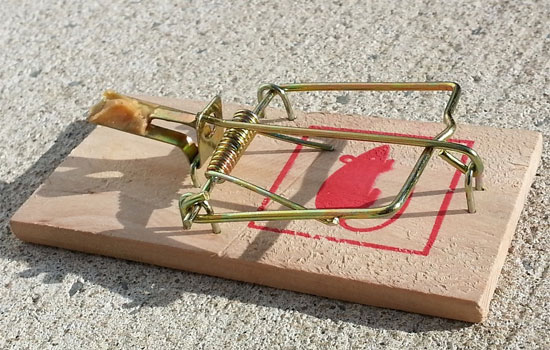
Mouse traps won’t kill otters, but can help to scare them away from your boat or dock.
That should be enough to stop the otters from coming back onto your boat again as they will soon learn that it’s simply not worth the time!
You can buy a pack of 16 very cheaply on Amazon. Take a look at mousetrap prices here.
#3: Ammonia & Cayenne Pepper
Many boat owners swear by a smell that critters will hate, and that’s a mix of ammonia and cayenne pepper.
It’s cheap and easy to try too.

Some boat owners say that otters hate cayenne pepper powder, so worth a try as a deterrent.
All you do is mix some up on a 50/50 split, and then either spray it or rub around the boat or dock edges.
It is said to work with other mammals too such as muskrats and racoons as well, as once they smell it could make them leave such is their hatred of it.
But they might come back, so if it does work successfully and keep the otters away you should repeat the process on a monthly basis.
#4: Humane Live Traps
If a family of otters has made their home under your deck, you might be able to finally solve the problem by using a live trap. There’s one on Amazon (click the image of the trap on the right hand side of the page) that is rust-proof, so works ideally in a river or lake environment.
Here’s what the manufacturer says about it:
- The right size for catching raccoons, otters, stray cats, woodchucks, groundhogs, opossums, armadillos and similar-sized pests.
- Rust and corrosion proof so built to last
- Dimensions: 32 inches x 10 inches x 11.63 inches.
- Use a spring loaded door to keep the pest inside.
- Made with a collapsible design so you can easily store it afterwards.
- Manufarued in the United States and isn’t a low quality imitation which could injure the animal.
- It uses a trigger rod is located outside of the trap so animal cannot damage it while in the trap.
I can’t recommend a humane live trap enough. But there are some things you need to be aware of when using them. Here are some tips:
- Wear tough gloves as otters can claw and bite you.
- Use fish-based foods as bait; fresh food is best, and sardines work very well.
- Use lots of food. The more in there, the more likely you will get them trapped.
- Be cautious if the otter looks unwell. They might have rabies.
#5: DIY Deadfall Humane Trap
Deadfall traps are commonly used by outdoors people to trap animals to eat.
But you can also use a similar method to not kill the otter, but to instead to give it a hell of a scare so that it doesn’t come back on your boat.
You can read more on how to set these up with a guide on the Instructables website, but how about being more creative and humane?
What you will need to do is rig up a bunch of old tin cans, one of which is filled up with cayenne pepper.
Otters will be very curious, as they are by nature, and will trip the deadfall so that all the cans come crashing down onto them.
As well as the horrendous noise it will make, it will also throw pepper that they hate all over the place, hopefully leading to them not wanting to come back anytime soon.
It won’t hurt them, it will scare them, and also means you don’t have a dead carcass to get rid of.
#6: Mothballs in the Boat and Off the Dock
Mothballs are a tried and tested method for discouraging pests, and previously on Pontoonopedia I’ve written about how this can help prevent mice nesting.
I wasn’t sure how effective mothballs would be with keeping otters off a boathouse or boat but do have a friend whose wife uses them to stop them coming into her lakeside studio.
Another guy I spoke to said how he built his own mothball otter deterrent device.
It’s pretty simple too, and involved making a black mesh nylon tube, filling it with loads of mothballs, and then hanging that from boat railings and the dock sides.
Otters tend to climb onto the dock first before they try entering a boat, so having them on hanging from the dock walkways could work particularly well.
It doesn’t cost much either to try, with a couple of dollars spent on mothballs, and some 6-inch-long mesh for each device, you could set this up for under 20 dollars in total.
If you use mothballs inside of your boat or boathouse, then it will smell of mothballs, but that’s way more preferable than the intense smell of otter dung and poop.
#7: Using Fatal Animal Traps
Depending on your local trapping laws (and ethics), you could set-up traps such as the Conibear 330.
I don’t personally recommend killing any animal, and these traps are fatal. But they are said to offer a humane kill, commonly used against racoons and otters.
It’s the most popular otter trap sold in the United States and is very easy to use.
You can buy these otter traps on Amazon – click to view prices.
#8: Large Active Dog
Dogs also seem to discourage otters from climbing onto a boathouse, boat, or marina dock.
Otters are scared of dogs, especially larger ones, and will view them as predators.
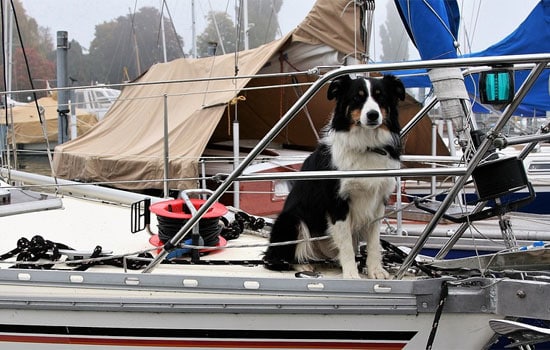
This guy could be all you need to get rid of and keep otters away, even if you do have to borrow him!
If you don’t own a dog yourself, see if you can borrow one from a friend over a weekend as the presence of the canine could be enough to deter the otters for a reasonable period of time.
#9: Electrical Fence Wire & Charger
This is possible method for marinas but could also be set up around the area where you dock you boat.
You can buy battery-powered, AC supply, or solar powered electrical fence set-ups that are traditionally used to keep livestock fenced in – but they keep things out too.
One guy on a popular boating forum uses a small electrical fence charger to stop racoons from getting into his area, so you would think it should work on otters too.
It’s a reasonable cost too, with everything that you would need to buy available on websites such as Amazon or from a local farm supply store.
Here’s an example of a solar-powered fence charger on Amazon.
Please do check your local laws before even considering this option though, and you should also be very careful with the installation.
#10: ScatMat Deterrent
You could even try a commercially available product called the ScatMat.
It’s designed for dogs and cats and use different modes to deter them from jumping and fouling in areas of your house.
It could work for otters too.
There are a number of settings available on the ScatMat including beeps that sound when pressure is applied, through to mild electrical pulses.
Again, you should check the legality of this option, but it could be set on the area where otters are coming into your boat or boathouse to great effect.
To see for yourself, take a look at the product description on the Amazon website, including the latest prices.
#11: Bird Spikes or Nails
We’ve all seen those spike nail rails above shopping mall entrances, signs, and commercial property entrances – they work very well for keeping birds (including seagulls) away from property.
I chatted with one guy who stopped otters from getting on his dock by putting 5-inch nails all around the perimeter of his floating docks. He said it worked very well for him, but I can’t help but think it could be quite hazardous to people as well.
I do think there is some mileage in this boat otter deterrent tactic though, as you can buy plastic strips with spikes in that are sold as bird deterrents.
By placing them on a swim platform, it could work very well to stop otters from jumping up and getting into boats and boathouses.
Cheap to buy, and simple to install, you can pick up bird spikes on Amazon.
But, before you do this, please do check to see if it’s legal to take an approach like this as you could be breaking the law.
#12: Pest Control Company
If all else fails, call in the experts.
Search Google for a pest control company near you and ask them to give you a quote.
Better still, ask for recommendations, as not all pest control companies will have experience in otter removals and prevention.
Do you own due diligence, search for online reviews, and then make your choice.
If you can, try and choose a pest control company that offers some form of guarantee, as you will know that they are serious about keeping the otters away from your boat, and should have the confidence to do so successfully.
Of course, this is the most expensive option.
Commercially Available Otter Repellent for Docks
Unfortunately, there are no legal or registered otter repellents marketed for sale, and despite what you might read, those high pitch sound machines don’t work.
How to Keep Otters Off a Dock or Marina
Instead you will need to trap them humanely (if it’s legal in your state) and then relocate them elsewhere, or completely block access to them completely using some of the methods detailed above.
How to Get Rid of Otters in Your Pond
Otters have a taste for fish. That’s great for them, but not so good for you if you’ve spent time and money putting a beautiful ornamental fish pond together, and stocking it with fish.
It’s not just the fish they will want. If they can’t get to your Koi carp and goldies, they will even try to hook out the fish food you place in the pond. And then there’s all the crapping they will do on the deck and surrounding pond area. Not nice.
The playful nature of otters means they will be naturally curious once they come across a pond. But once they find your fish pond, knowing how to get rid of them will be your next challenge.
Once hack I’ve seen on pond owner websites is to use a lemon grass otter repellent. This works much the same as an insect repellent but smells a lot nicer to me and you. Not for the otters though!
But doing that means you will have to put lemongrass candles around your pond. It won’t last long and isn’t the most effective solution given the short lifespan of a candle.
I asked on Facebook if anybody knew how to get rid of otters in your pond, and one guy replied saying he was using a coyote and fox urine granules.
He said it was the best otter repellent he had used. Was non-toxic, easy to spread around the pond, and scared away the otters who thought a predator or other animal might be around.
It’s worth a shot, as the granules are quite cheap. You can see the repellent granules on Amazon.
One last tip: you can get rid of otters near your pond by making a heck of lot of noise when you use them. If you’ve got two old metal bin lids, smash them together. That can work well according to one pond owner I spoke to.
How to Get Rid of Otters Under a Deck
River otters love to shelter underneath decks, mobile homes, and under houses built next to the water. Getting rid of them from under a deck can be a long and drawn out process.
Many people will use live traps. They will bait the traps with oils from another otter, or by placing some smelly fish inside. Otters can’t resist the smell of decaying fish. It’s going to be nasty for you but could provide a solution if it’s a family of otters who have decided to make home under your deck.
Amazon sell a human live trap (see live trap prices) that can help you to get rid of otters under a deck. It has a spring-loaded door, and won’t rust or corrode, making it ideal for use next to a river or dock deck.
How to Get Rid of Otters in a Boathouse
Otters are a huge problem for boathouses. I would recommend that you try any of the repellent and deterrent methods list above including the ideas on otter repellents for docks.
How to Get Rid of Otters Under a Lake
The tips here for flushing them out of your lake, are the same as the methods listed above.
How to Remove Otter Poop or Dung
Of course, aside from the damage that otters can cause to a boat, one of the most odious problems you will face is their mess.
They simply love to mark boathouses, boats, and marinas with their poop, and any step or place they can get onto, they will leave you a lovely reminder of their presence.
But the thing is, they are clever, and chances are you will never see them doing it, as it tends to be a night time activity for them.
The smell has been compared to rotting fish, and the poop leaves a gluey, sticky, stinking mess.
The best way to remove otter dung from a boat deck or dock marina area is to use a high-pressure washer.
Otter poop doesn’t stick on particularly hard, so it should remove pretty quickly using this method.
How to Get Rid of Otters in Your Trash
But what about otters that are getting into your trash and bins? The best way to get rid of otters who like to nose around in your garbage is to raise the bins up if you can.
I’ve seen people place theirs onto platforms which extends over the platform legs. That can deter them from climbing up.
They are very resourceful creatures though and will do everything that they can to get to your rotting food leftovers.
Making loud noises can help, and I mentioned that earlier in the section on keeping otters away from a houseboat or under a lake.
Alternatively, try some of the repellents and deterrents listed further up this page.
What Other Boat Owners Say
I chatted with some boat owners I know on social media who live in areas where otters are common, and here is a selection of the best and most useful comments they replied with.
“We can have problems with otters in our marina, and use motion activated alarms to scare them off. For us it works great and keeps them off all the boats in the dock area.”
“On Saturday, we went to our boat and found that it had piles of crap all over the floor. Next to these piles we’re piles of fish scales. Never knew it, but evidently, Lake Anna has an active otter family. I’d say I am flattered that they liked our boat, but no. We were not impressed, other than by the amount and the smell. Another adventure of having a boat, I guess!”
“Actually, this occurs at our marina, but it happens mainly to patrons whose boats are left in the water and are covered. Otters find it easy to climb aboard and they like the covers for weather protection. And the damaged boats are mostly on the outside slips. So sorry for your experience.”
“This is something I am worried about all winter after hearing a similar story from another person at our marina. They had to completely replace their interior seats and carpet to get rid of the odor. They said they would never cover again as otters like to nest under the covers.”
“Be very cautious of loose fitting covers as they are easy for critters and otters to get under and into your boat if it stays on the water. Here on Norris Lake in Tennessee we have problems with otters and beavers in the wintertime, so I speak from experience!”
“I’ve heard people mentioning Damp Rid. This will do nothing to deter otters. You should speak to others in your marina, only they can answer the critter questions. We only cover our slipped boats spring, summer and fall, as in winter there are no spider or bird issues. Otters only look for warm places to hide in the winter.”
The Final Word
Having otters on your boat or dock can turn into a very expensive problem, so it’s worth preventing it from happening in the first place.
Otters tend to move around in family units, so if you see one in the water near you, chances are there’s going to be a pack of them in the local area.
They can grow in size to over 100 pounds, and that’s a lot of critter to deal with once they start coming onto your boat or marina.
I don’t recommend killing any animal, even pests.
You might feel different, and each to their own, but whatever you do decide to do, please make sure that you adhere to your local trapping and wildlife laws.
Elsewhere on the website you can find additional guides for other types of pests and critters you can play havoc with your boat. I’ve listed those below.

